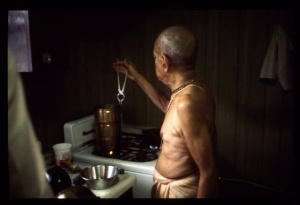CC Antya 3.179 (1975): Difference between revisions
(Vanibot #0027: CCMirror - Mirror CC's 1996 edition to form a basis for 1975) |
(Vanibot #0020: VersionCompareLinker - added a link to the Version Compare feature) |
||
| Line 2: | Line 2: | ||
<div style="float:left">'''[[Sri Caitanya-caritamrta (1975)|Śrī Caitanya-caritāmṛta (1975)]] - [[CC Antya (1975)|Antya-līlā]] - [[CC Antya 3 (1975)|Chapter 3: The Glories of Śrīla Haridāsa Ṭhākura]]'''</div> | <div style="float:left">'''[[Sri Caitanya-caritamrta (1975)|Śrī Caitanya-caritāmṛta (1975)]] - [[CC Antya (1975)|Antya-līlā]] - [[CC Antya 3 (1975)|Chapter 3: The Glories of Śrīla Haridāsa Ṭhākura]]'''</div> | ||
<div style="float:right">[[File:Go-previous.png|link=CC Antya 3.178 (1975)|Antya-līlā 3.178]] '''[[CC Antya 3.178 (1975)|Antya-līlā 3.178]] - [[CC Antya 3.180 (1975)|Antya-līlā 3.180]]''' [[File:Go-next.png|link=CC Antya 3.180 (1975)|Antya-līlā 3.180]]</div> | <div style="float:right">[[File:Go-previous.png|link=CC Antya 3.178 (1975)|Antya-līlā 3.178]] '''[[CC Antya 3.178 (1975)|Antya-līlā 3.178]] - [[CC Antya 3.180 (1975)|Antya-līlā 3.180]]''' [[File:Go-next.png|link=CC Antya 3.180 (1975)|Antya-līlā 3.180]]</div> | ||
{{CompareVersions|CC|Antya 3.179|CC 1975|CC 1996}} | |||
{{RandomImage}} | {{RandomImage}} | ||
==== TEXT 179 ==== | ==== TEXT 179 ==== | ||
| Line 13: | Line 12: | ||
:jātānurāgo druta-citta uccaiḥ | :jātānurāgo druta-citta uccaiḥ | ||
:hasaty atho roditi rauti gāyaty | :hasaty atho roditi rauti gāyaty | ||
: | :unmādavan nṛtyati loka-bāhyaḥ | ||
</div> | </div> | ||
| Line 27: | Line 26: | ||
<div class="translation"> | <div class="translation"> | ||
"When a person is actually advanced and takes pleasure in chanting the holy name of the Lord, who is very dear to him, he is agitated and loudly chants the holy name. He also laughs, cries, becomes agitated and chants just like a madman, not caring for outsiders.' | |||
</div> | </div> | ||
| Line 34: | Line 33: | ||
<div class="purport"> | <div class="purport"> | ||
For an explanation of this verse ( | For an explanation of this verse (Bhāg. 11.2.40) one may consult Chapter Seven, text 94, of the Ādi-līlā. | ||
</div> | </div> | ||
Latest revision as of 01:10, 27 January 2020

A.C. Bhaktivedanta Swami Prabhupada
TEXT 179
- evaṁ-vrataḥ sva-priya-nāma-kīrtyā
- jātānurāgo druta-citta uccaiḥ
- hasaty atho roditi rauti gāyaty
- unmādavan nṛtyati loka-bāhyaḥ
SYNONYMS
evam-vrataḥ—when one thus engages in the vow to chant and dance; sva—own; priya—very dear; nāma—holy name; kīrtyā—by chanting; jāta—in this way develops; anurāgaḥ—attachment; druta-cittaḥ—very eagerly; uccaiḥ—loudly; hasati—laughs; atho—also; roditi—cries; rauti—becomes agitated; gāyati—chants; unmāda-vat—like a madman; nṛtyati—dances; loka-bāhyaḥ—not caring for outsiders.
TRANSLATION
"When a person is actually advanced and takes pleasure in chanting the holy name of the Lord, who is very dear to him, he is agitated and loudly chants the holy name. He also laughs, cries, becomes agitated and chants just like a madman, not caring for outsiders.'
PURPORT
For an explanation of this verse (Bhāg. 11.2.40) one may consult Chapter Seven, text 94, of the Ādi-līlā.